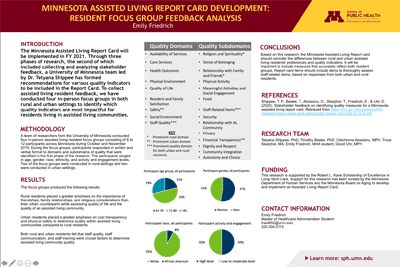Emily Friedrich
MHA, Healthcare Administration
Advisor:
Dr. Tetyana Shippee
Educational Objectives:
- Analyze feedback from current assisted living residents on nine preliminarily-identified quality domains and additional subdomains to determine the validity of each domain’s application to assisted living quality.
- Identify three themes and distinctions between rural and urban residents’ perceptions of the importance of specific quality domains.
Keywords:
Assisted Living, Legislation
Abstract
Recent years have brought significant changes to the assisted living regulatory landscape in Minnesota. Resulting from legislation passed in May of 2019, Minnesota will implement an Assisted Living Report Card in fiscal year 2021 (July 2020 – June 2021). The report card will be used to measure and report on the quality of individual assisted living communities across the state. A team from the University of Minnesota continues to conduct the research necessary to identify the quality indicators that will be used to formulate the report card.
The first phase of this research concluded in July 2019 and consisted of a literature review and environmental scan to identify quality measures and domains within assisted living environments. The second phase of this research concluded in January of 2020 and focused on collecting and analyzing stakeholder feedback on the quality domains identified during Phase I, including that of assisted living residents. The domains considered are as follows: resident quality of life, resident and family satisfaction, safety, resident health outcomes, staff, the physical and social environment, service availability, core values and philosophy, and care services and integration.
To gather this crucial feedback, four focus groups were conducted in assisted living communities across Minnesota, including two in rural communities and two in urban areas. The feedback gathered from these focus groups indicated substantial differences between rural and urban residents’ perceptions of importance within some quality domains including cost transparency, safety, and relationships impacting quality of life.
Support
This research is supported by the Robert L. Kane Scholarship of Excellence in Long-Term Care, the Minnesota Department of Human Services, and the Minnesota Board on Aging.

View Presentation (PPSX)
